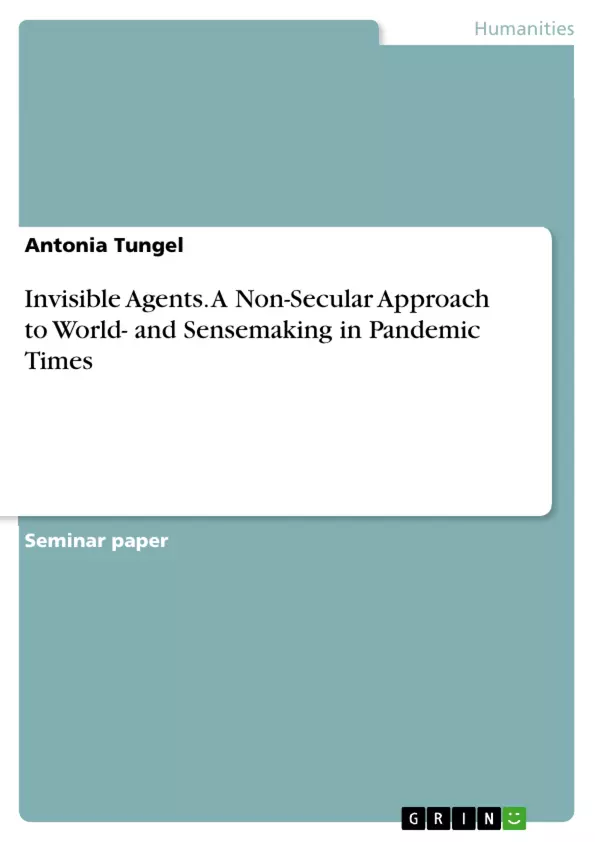Based on the topic of human-environment relation, I am going to delve into the question of who is subjectively identified as a ‘supernatural agent’ and what type and scope of agency is attributed. In the context of the seminar that also asks about the connection to COVID-related healing practices, I will then link the concept of supernatural agency with phenomena of health. Thereupon I want to present the methods and findings of my research following the guideline question: How do religious actors in Germany and Indonesia connect their belief with medical action against the Covid-19 pandemic?, focusing on Christian actors in Germany.
Toward the end of 2019, a tiny entity given the name SARS-CoV-2, overpowered the world with a relentless ferocity that sharply exposed the vulnerability of modern human civilization. A belief in the superiority of our species, in the progressiveness of modern social systems, in the achievements in technology and medicine, could not save us from the power of “one of nature’s most miniscule members". With the ongoing spread and unpredictable mutation of the COVID-19 virus, a global war has been declared on something biologically not even classified as a living being, and states mobilize all resources to regain control. This ‘invisible agent’ challenges our personal lives and state action just as much as the postulated separation between humanity and ‘nature’. Not only must we acknowledge the virus as a more-than-human global actor in contrast to humans as being the only forceful agents “acting upon a passive world”, its assumed origin in zoonosis also marks a point of fusion between human and non-human realms, and therefore can be seen as a reinforcement of entanglement that transcends nature/culture dichotomy.
Inhaltsverzeichnis (Table of Contents)
- Introduction.
- Human-Environment Relation
- Constructing Nature and Environment.
- The Merging of Dividing Lines: The Human and the Non-Human.
- The Merging of Dividing Lines: The Natural and the Supernatural
- Coming Towards a Radically Inclusive Ecology
- Agency
- Agency of Non-Humans.
- Agency of the Supernatural
- Religion and Health..
- Characterizing Religion.......
- Characterizing Christian Religion
- Religion and Health..
- Summary
- Researching Religious Actors
- Frame, Design and Methods.
- Interviews and Findings
- Conclusion..
Zielsetzung und Themenschwerpunkte (Objectives and Key Themes)
This work explores the impact of the COVID-19 pandemic on our understanding of the human-environment relationship, specifically focusing on the role of "invisible agents" such as viruses and supernatural entities. It aims to challenge the traditional separation between humanity and nature, advocating for a more inclusive understanding of agency and worldmaking.
- The merging of dividing lines between the human and the non-human.
- The blurring of boundaries between the natural and the supernatural.
- The concept of more-than-human socialities and the agency of non-human beings.
- The role of religion in shaping perceptions of health and healing.
- The impact of belief systems on medical action in the context of the COVID-19 pandemic.
Zusammenfassung der Kapitel (Chapter Summaries)
The introduction sets the scene by discussing the COVID-19 pandemic as a catalyst for re-evaluating our relationship with the environment and acknowledging the agency of non-human actors. Chapter 2 delves into the concept of "nature" and its constructed nature, highlighting the interconnectedness between humans and their surroundings. This chapter also explores the merging of dividing lines between the human and the non-human, the natural and the supernatural, ultimately advocating for a more inclusive understanding of ecology.
Chapter 3 focuses on the agency of non-human and supernatural entities, examining how they shape our world and participate in "more-than-human socialities." Chapter 4 delves into the role of religion in shaping our understanding of health and illness, specifically focusing on Christian perspectives. This chapter provides a framework for understanding how religious beliefs intersect with medical action in the context of the COVID-19 pandemic.
Schlüsselwörter (Keywords)
The core concepts explored in this work include human-environment relations, more-than-human agency, supernatural entities, religion, health, and the COVID-19 pandemic. The text examines the impact of belief systems on medical action, highlighting the importance of an inclusive understanding of ecology and worldmaking that encompasses both the natural and the supernatural.
- Quote paper
- Antonia Tungel (Author), 2022, Invisible Agents. A Non-Secular Approach to World- and Sensemaking in Pandemic Times, Munich, GRIN Verlag, https://www.grin.com/document/1190789



